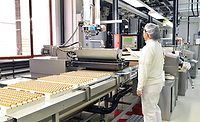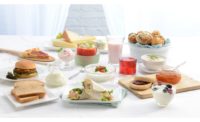Ray Kroc and Colonel Sanders are legendary icons of fast food. Working alongside them at the outset was an invisible pioneer of the quick serve industry's technology and operations: Ben Koether, chairman and founder, FAST and Kitchen Brains (formerly SCK Direct). Although the famous names have passed, Koether is still at the vanguard, increasing efficiency, improving food safety and revolutionizing the kitchen—by equipping it with ‘brains.’
Ben Koether only ever had food poising once. It was 1964 and the new salesman for the former American Machine & Foundry (AMF) had scheduled an 11 a.m. meeting with a now defunct Miami, FL restaurant chain. After the meeting, Koether sampled one of the restaurant’s milkshakes and then began to make his way to his second meeting, this time with a Burger King executive.
“I drove out of the parking lot and didn’t get a mile down the road before I became violently ill. My body went into convulsions. I had shivers and shakes so badly that I had to pull into a motel and cancel my meeting with Burger King,” recalls Koether. “I have a pretty strong system, so I managed to eventually shake it off. The food poisoning was in and out of me pretty fast and I recovered in a few hours. But it made a huge impression on me.”
It was obvious to Koether that the milkshake machine not been cleaned properly or restaurant employees had allowed the milk product to get too warm. He became acutely aware that the majority of employees working in restaurants likely had no sense of the food chain or food safety, an awareness he had acquired growing up on a farm.
“I knew all the rules of butchery, milk and dairy production and fruits and vegetables. I’d grown up knowing the importance of sanitation—seeing the milk being pasteurized, the fruits and vegetables sealed or canned, the meats cooked or smoked—and been trained without anyone ever telling me. I knew mistakes could kill people,” said Koether.
Koether carried this natural instinct with him as he continued working in the fast food/foodservice industry. While most restaurant employees—particularly those working in mom and pop operations in the 50s and 60s—didn’t have any sensibility about cleanliness, sanitation or food safety, some of his clients had been trained in food science and knew they had to absolutely keep their operations clean and safe.
“That was a hallmark of McDonald’s,” said Koether. “Always have good, safe food at very reasonable prices. You could go to any McDonald’s anywhere and depend on that.”
Learning from the Master—Ray Kroc
Koether was introduced to McDonald’s and its legendary founder Ray Kroc while working at AMF, which was trying to recreate the success it had had with bowling alleys—also a labor-intensive business with random peak business demand times. After inventing the auto pinsetter, AMF had a vision that the restaurant business was similar and could be automated in the same way.
A prototype restaurant in Long Island City already had machines that could auto-cook hamburgers and dispense drinks, but it experienced only moderate success. More joint venture development efforts were established with Howard Johnson, Marriott Hot Shops, a Kentucky Fried Chicken franchisee, as well as other independent restaurateurs. The experiments proved unsuccessful however, as initial capital costs were high and technology expensive to maintain. The machines broke down often and weren’t flexible enough to meet the constantly changing menu required to satisfy consumers’ fickle appetites.
The project was dying. Reviewing the company’s core technology, Koether was inspired. One of AMF’s machines had the capability to auto-bag French fries, McDonald’s flagship product then and today. Wanting a better understanding of how the quick serve restaurant operated—and which of the company’s technology would work there—Koether went to work at McDonald’s “Hamburger University” seven days a week as a crewman, learning how to open, close and run a store, handling accounting and picking up litter in the parking lot alongside Ray Kroc.
“It was a small company then, 300 stores and not public. I got to know Fred Turner and Ray Kroc very well. I often visited with them in the office they shared at 221 North LaSalle Street in downtown Chicago, talking and learning their entrepreneurial spirit—which sometimes included screaming, yelling and throwing things,” laughs Koether. “I’d be all buttoned up in my three-piece suit…I’d gone to Columbia, was in the service…and there I was with these two enthusiastic guys exploding with ideas, throwing things at each other.”
Koether convinced Kroc and Turner to try the auto-bagging machine, but it proved difficult to maintain and the shortening, which was a blend of pork rind and beef, would plug up the machine. A second machine had potential, a special electronic cash register (the world’s first in a fast food restaurant) with preset menu buttons-Hamburger, French Fries, Soda—and multiplier keys so employees could quickly and easily type in the customer order: 3 hamburgers, 2 Soda, 1 Coffee, 3 Fries. Product and quantity were instantly totaled and displayed on a screen to the customer. Two competitors had similar products, but being less sophisticated, McDonald’s chose AMF’s machine, hands down.
Finger-Licking Good!
By 1967, Koether was part of the McDonald’s family and had sold a contract to the company for electronic control systems (now called POS), that ran in stores, calculating raw material consumption, automatically reporting to headquarters and making servicing customers and hiring counter staff quicker and easier. Koether met Donn Wilson, originator of Hamburger University, and completed the school (but laughs that he never received his degree.) Today, Wilson is still with Koether, sitting on the Board of Koether’s newest company Kitchen Brains.
“Fred [Turner] asked me to travel, go to McDonald’s conventions and speak about the POS computer system. I may have been the first vendor that ever spoke at a McDonald’s convention,” recalls Koether. “Every night we would party! Ray played piano; we sang songs and recruited new franchisees. They even asked me to come to work for McDonald’s, but I told them I couldn’t change sides in the middle of a business transaction.”
Koether was introduced to Colonel Sanders and learned how to produce “finger-licking good” fried chicken in a pressure cooker on a South Bend stove top. One of Koether’s fondest memories was convincing football star Gino Marchetti of the Baltimore Colts to buy cooking computers.
“GINO’S hamburger restaurant chain was founded by Marchetti and Alan Ameche. They had taken over a KFC franchise to boost their customer base and sales. That sale took a lot of male bonding!” laughs Koether. “Three or four 300 pound, 6’4” football guys dragging along a 5’9”, 165 pound salesman from one den of iniquity to another until they accepted me as one of them. Well, we bonded, and I managed to bond with the Colonel and ….well that is another story all in itself!”
Soon thereafter, AMF opted out of the cash register business, declining to compete with IBM. The company shut down the rest of the operation and walked away from the contract with McDonald’s. Koether went home and worked on a business plan to build his own point-of-sale machine.
When One Window Closes…
It was about this time—June 1969—that the stock market collapsed; and on the day of closing for funding to back his idea, the venture capital fund went bankrupt. Koether’s wife convinced him to move forward with starting his own company, so he called on all of his industry contacts, who generously provided the seed money. Koether now had investors, and simultaneously, a customer.
A former McDonald’s executive, then at Hardees, called Koether and set up a meeting with Hardees company president, Leonard Rawls. By August of that same year, Koether made a prototype of a machine, a Cooking Computer. Hardees ordered two for every store. Soon every fast food chain (except McDonald’s) had Koether’s machine in its restaurants.
Koether next built and sold lines of timers, electronic temperature controls and fryer controls with food safety as a goal, if not necessarily a selling point.
“When we started developing electronic products, we were very aware of food safety issues and made sure everything we did reinforced it. The goal was to assist people who weren’t schooled in food science, making sure employees always did the right thing at the right time,” explains Koether. “But we didn’t sell it as ‘food safety’ because that wasn’t a popular notion back then. Instead, we positioned it as a predictable process that improved upon the quality of the food.”
The rest, says Koether, is history. The emphasis on food safety, having started in Europe, wouldn’t become a popular notion until the early to mid 1980s, with a push toward having health authorities make sure all people in the foodservice industry understood the importance of food safety.
By the time the rest of the industry caught up, Koether had already been growing the quick serve industry alongside the heavy hitters and revolutionizing restaurant operations for nearly two decades. As founder of FAST and Kitchen Brains, a global in¬dustry leader in timers, temperature controls and process control¬lers for the foodservice industry, Koether is credited with leading the evolution of the commercial kitchen with the development and deployment of integrated, end-to-end, wireless machine-to-machine networking solutions and software-as-a-service applications for the commercial foodservice industry. These systems not only increase productivity and profitability, but also decrease waste and improve food safety using complex formulas that predict how much food needs to be prepared at what times, decreasing the chance for spoilage. Automated cooking programs assure that foods are heated to the most appropriate and safe temperatures for consumption.
“As awareness grew within the industry, we made a bigger effort to extend our footprint—by talking more about what we had already been practicing for 20 years,” concludes Koether.
A family-run business with both of Koether's sons, Christian and George, at the helm alongside Koether, Kitchen Brains is headquartered in Stratford, CT and has offices in the United Kingdom and Singapore.
Suzan French is a former journalist, freelance writer and president of FlackShack, a marketing communications firm based in Allentown, PA. Ms. French writes on a variety of topics, including business, industry, CEO/executive/company profiles, lifestyle and travel.
Paula Beck is a freelance writer based in Allentown, PA. Her work has appeared in numerous newspapers and magazines, including The Elucidator, Lehigh Valley Style and Today’s Restaurant News. She covers a wide variety of topics including business profiles, travel, health and wellness. She has also written several articles on restaurants, and restaurant equipment.



